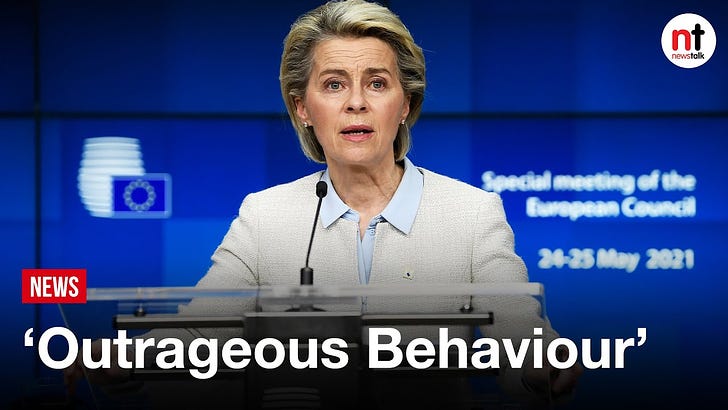Welcome to The Chief Brief. Every Sunday, I spotlight global, diverse, and innovative female leaders, and the news influencing them to change the world. The CB curates news from around the world, breaks down the story, and helps you connect with the women making news! It is my first step in a passion project to build a globally connected community of women leaders.
Happy Sunday!
It’s been a busy week for the ladies in business and policy. From dealing with IPOs, fund raising and lawsuits, to creating roadmaps for climate action, economic recovery and standing up to bullies. So let’s get you all caught up!
Policy matters
Stand up to bullies
Last Sunday, as I waited to board my flight from Gibraltar to London, I saw the breaking news of Ryanair flight FR4978 from Athens to Vilnius being hijacked by a Belarus air force MiG-29 fighter jet. The flight path was from an EU/NATO country to another, but took the plane over Belarus airspace. On board, was a Belarusian journalist and opposition activist Roman Protasevich and his girlfriend Sofia Sapega. Both were arrested as soon as the plane landed in Minsk.
It created a visceral fear amongst many including me at that Gibraltar airport, that it wasn’t safe to fly across Europe. That if someone was openly critical of an autocrat, they were now at risk of being kidnapped by a government. But considering the usual slow, and toothless response of the EU to these acts, no-one predicted Ursula von der Leyen and the heads of European countries would do anything more than release an angry statement, and slap a few sanctions on a few Belarusians.
Von der Leyen and crew surprised everyone! Yes, there were sanctions against a few people, but that was backed by sanctions on businesses funding Belarus leader Alexander Lukashenko. Most importantly sanctions were slapped on the country’s aviation sector by creating a no-fly zone over Belarusian airspace, and by banning Belarusian airlines from the EU.
As the week progressed, von der Leyen almost went to the extent of calling for regime change. In a typical carrot and stick operation, she has put on the table a €3 billion aid package (that was put on hold) if the country moves peacefully to democracy. If not, the EU is threatening to impose more sanctions over the country’s crackdown on critics of its autocratic leader.
In the meantime, the aviation map for travel in Europe has dramatically changed, and the U.S. is drawing up its own sanctions. But on the flip side of this geopolitical ticking time bomb, Russia has given Lukashenko a $500 million loan to tide him over, while refusing to let European flights land in Moscow.
Overhauling renewable rules
EU Commissioner for Energy Kadri Simson is overhauling the renewable energy regulations of the European Union. 12 climate change policies will be unveiled in July and will include measures targeting transport and industry, where the use of emissions-free energy sources is lagging. The EU revamp aims to promote power purchase agreements for renewable energy and target sectors that have been slow to take up sources like wind, solar or bioenergy.
Measures could include setting indicative targets, labelling industrial products made using renewable, and potentially tighten the sustainability rules that forest biomass must meet to be counted as renewable when burned to produce energy. Read more here.
Rising inflation won’t last
U.S. Treasury Secretary Janet Yellen thinks higher inflation in the U.S. will last into next year, but then fade. Rejecting Republican objections that seized on the Biden $4 trillion spending plan as spurring that inflation, she’s been emphatic this week that the U.S. Congress needs to open its wallet to oversee a real economic recovery. Read more here.
Business & tech
Figs debuts on the NYSE
Medical scrubs weren’t considered fashionable. Well, not until 2013 when Heather Hasson and Trina Spear decided to take hospital wear out of seedy shops in strip malls and make them trendy. Applying the strategies of direct-to-consumer e-commerce brands Heather and Trina to medical apparel, Figs started sell $48 uniform pants and $38 shirts online. This week, the medical apparel company listed on the NYSE in what is likely the first IPO led by two female cofounders. Investors seem to love the Figs story with the stock rallying well past the $22 IPO price. Read more here.
I’m pregnant. So what?
Canadian e-commerce company Knix Wear Inc., founder and CEO Joanna Griffiths has raised $53 million dollars in its latest funding round designed to fuel an ambitious expansion plan. And she did it while heavily pregnant, with twins. During the round she drew a line in the sand with one non-negotiable rule - any investor who raised that as a concern would be immediately disqualified from bidding. A “small number” of prospective investors were ruled out. Read more here.
“If that’s how they felt about me as an entrepreneur and as a female founder, they sure as hell were not going to understand the mission of Knix and what it is that we’re trying to accomplish.” - Joanna Griffiths
All fo-u-r one
Four women beat Alphabet’s Google in court this week. They are now allowed to represent 10,800 other women like them at Google, in a class-action status to pursue their gender-pay disparity lawsuit against the tech giant. They claim Google pays women less than men for doing the same job and are seeking $600 million in damages. The trial is expected to kick off in 2022. Read more here.
DBS wants female engineers
If you know talented women in engineering looking for a leg up, send them this note. DBS Bank, a Singaporean multinational banking and financial services corporation is tripling the number of jobs available at this year’s edition of its ‘DBS Women in Tech’ virtual career fair, with more than 140 openings available for women. This year DBS is focusing its recruitment drive on five engineering roles, namely engineering lead; solution architect; ReactJS developer; full stack developer; and software development engineering in test. Read more here.
Pink ride-hailing
Next time you’re in Kinshasa and spot hot pink taxis buzzing around the busy capital of the Democratic Republic of Congo, you’ll know looking at an Ubiz cab. The drivers are all dressed in pink and grey. And they are all women (except at night, when male drivers take over).
The all-woman ride hailing platform was founded by Patricia Nzolantima. The firm is not just attempting to address the DRC’s conflict-ridden reputation but also offer women an opportunity for safe employment. And for its female customers, safe transport in a city known for violence against women. The company offers a $300 monthly salary, and tracking to ensure safety. Read more here.
Interested in women-exclusive ride hailing apps around the world? Here are a few:
Lily Ride—Bangladesh
Femitaxi—Brazil
An-Nisa—Kenya
Fyonka—Egypt
GoPink Cabs, Meru Eve, Pink Taxi, Women’s Cabs, She Taxi, Sakha Cabs—India Ojesy—Indonesia
ChaufHer—South Africa
Rosy and Pink Cabs, Pink Ladies—UK
Debating gender in ride-hailing
If you’re interested in the gendered segregation in the ride hailing industry, its commercial feasibility and the nuances of the debate surrounding it - the International Finance Corporation has written a paper about Covid’s impact on women and the transport sector. Read more of their perspective on gendered ‘building back better’ here.
If you enjoy reading the brief, please spread the word!
Caught my eye
Carrie got married
It’s being described as a stealth wedding, but Covid rules and Dominic Cummings’ testimony bringing down heat on the U.K. Prime Minister Boris Johnson probably decided the format and date for the happy couple. Per U.K. Covid rules, 30 people watched Carrie Symonds marry Boris Johnson on Saturday May 29th at a small ceremony in Westminster Cathedral. A bigger celebration is planned for the summer of 2022.
The former press adviser to the Conservative party joins the Johnson family as the PM’s third wife. She is also mother to the PM’s 5th child. But despite being considered influential within the PM’s circle, Carrie does not have any official role in U.K governance, as country does not have an official position of ‘First Lady’. Read more here.
Still missing: Dubai’s disappeared princess
Princess Latifa, daughter of Dubai’s ruler is still missing. Last week three pictures of her emerged on social media, after numerous calls by the UN human rights office to see proof of life. One picture was at a mall, others at a restaurant.
Now sources claim the women who posted those pictures were at some point employed by the Dubai royals and were ordered to post them. They’ve been identified as two of the princess’s former chaperones and an acquaintance who works as a clairvoyant. Read more here.
Polarising opinion journalism
AP fired 22 year old journalist Emily Wilder on May 19th for her “pro-Palestine” tweets. That kicked off a massive debate about social media practices for newsrooms. But the problem according to a Stanford lecturer (who was also Emily’s teacher) isn’t bias, its disinformation campaigns about journalists. She says rules about dos and don’ts on social media need to be made crystal clear by news organisations. Read more here.
“It’s essential that news outlets in particular are able to distinguish between organic outpourings of outrage or grievance online and targeted campaigns that seek to undermine the legitimacy of news organizations and obscure the facts around conflicts.” Janine Zacharia, Carlos Kelly McClatchy lecturer, Stanford University
Be a sport
I’d rather pay a fine
That’s what Naomi Osaka would rather do, than speak to the media at the French Open. Her decision to not attend ATP tour mandated press conferences she says is based on her mental health effects of interacting with the press post matches. With the tennis media pool comprising of niche journalists from different countries with different motivations, the pressers can get ugly. World number 1 Novak Djokovic says it’s part of the sport. But for some observers, Naomi’s decision (along with a few players before her) is predicated on the ability of athletes to directly interact with their fans on social media, cutting out the necessity of journalists. Read more here.
Racing to equality
The epic, 200-lap Indy 500 race start time is at 17.45pm BST (12.45pm ET) today (Sunday May 30th). Keep your eyes on Paretta Autosport in today’s race.
For the first time in motorsport history, this will be the team where the driver, the owner, the spotters, two engineers, the front office and most of the pit crew will be women. Team owner Beth Paretta hopes their performance alone will lead to the novelty of her team being majority women, wearing off in a few years. Read more here.
The artsy stuff
Ambivalent Cruella
If you loved 101 Dalmatians, its prequel Cruella (starring Emma Stone) is out. The movie follows Cruella de Vil from her roots as an orphaned urchin to an aspiring fashion designer determined to avenge her mother's death. The Royals got dressed to sit in a vintage range rover to host and watch Cruella in Scotland. They left that screening with rather big smiles. But the royals must smile, no matter what. The critics on the other hand aren’t hamstrung in the same way, and their reviews have been mixed (to put it politely).
“Messy, flabby and confused,” “lukewarm style over substance - with a narrative that's not as bold as its design,” “Some youngsters might be befuddled by the plot, which could have stood a bit of muzzling.”
Others have been a little more positive. “As remakes and spin-offs go, this one's barking up the right tree,” “Cruella is packed full of energy, action, punchy performances, incredible style, delightful dogs and one of the best soundtracks in modern film.” Read more here.
Have you met
Laurence des Cars, curating France’s iconic Louvre
Laurence des Cars is the first woman in 228 years to appointed to the helm of the Louvre. She takes over the running of France’s (arguably perhaps even the world’s) most prestigious museum on September 1st, just four years after she became the first woman to head the Musée d’Orsay, located just a stone’s throw from the Louvre.
Laurence is an art historian and specialist of the 19th and 20th centuries. She has been credited for significant strides made to expand the Musée d’Orsay’s exhibition rooms and introduce greater diversity in its shows. Read more here.
On the move
In the U.S.
Celeste Mellet Brown has been appointed as Evercore’s first female CFO. Most recently, Celeste served as EVP & CFO at Fannie Mae; prior to that, she has spent 18 years at Morgan Stanley, where she served in a variety of roles.
Isabel Soriano is the new president of international of Wolverine Worldwide, the shoemaker. She joins the company’s executive leadership team. She previously has worked for Vans, Timberland and Kipling in South America at VF Corporation. She has also held senior roles at Timberland and Nike.
In the U.K.
Sue Hayes has taken over as CEO at GBB. Currently undergoing the regulatory process of becoming a bank GBB will be a dedicated lender to SME property developers in underserved UK regions. Previously, Sue led the retail finance business at challenger bank Aldermore. She also held executive positions at HBOS and ran retail and business banking at Santander before moving to Barclays Bank where she led business banking.
In Nigeria
Dr. Omobola Johnson takes over Guinness Nigeria as the company’s new Board Chair on July 1st. She is a Nigerian technocrat and the Honorary Chairperson of the global Alliance for Affordable Internet. She is also a former Nigerian Minister of Communication Technology.
In Kenya
Flora Mutahi has been appointed as The Kenya Private Sector Alliance’s first female Board Chair. Flora is also chairperson of the Kenya Association of Manufacturers. She is also the founder and chief executive officer of Melvin Marsh International Limited the manufacturer of Melvin's Tea.
In Antarctica (sort of!)
Robyn Woodhead has taken up the top job at the International Association of Antarctica Tour Operators (IAATO). Based between Cape Town, London, and Antarctica she also serves on IAATO’s Climate Change, Gateway and Deep Field Committees. Robyn is also Director of White Desert, the first ever luxury tourism camp in Antarctica.
Sunday long read
The productive power of doubt
The one trait that we universally seem to look for in leaders is decisiveness. Doubt has no place in the decision-making process. Or that’s the long-held belief in defining what makes a good leader. Nicola Reindorp, CEO of Crisis Action, a civil society organisation working to protect civilians from armed conflict says, she even held herself back from the C-suite because of her doubts. But when she dug a little deeper, she found there was a productive side to doubtfulness makes leaders stronger and more powerful. Read her insights here. (10 minute read)






